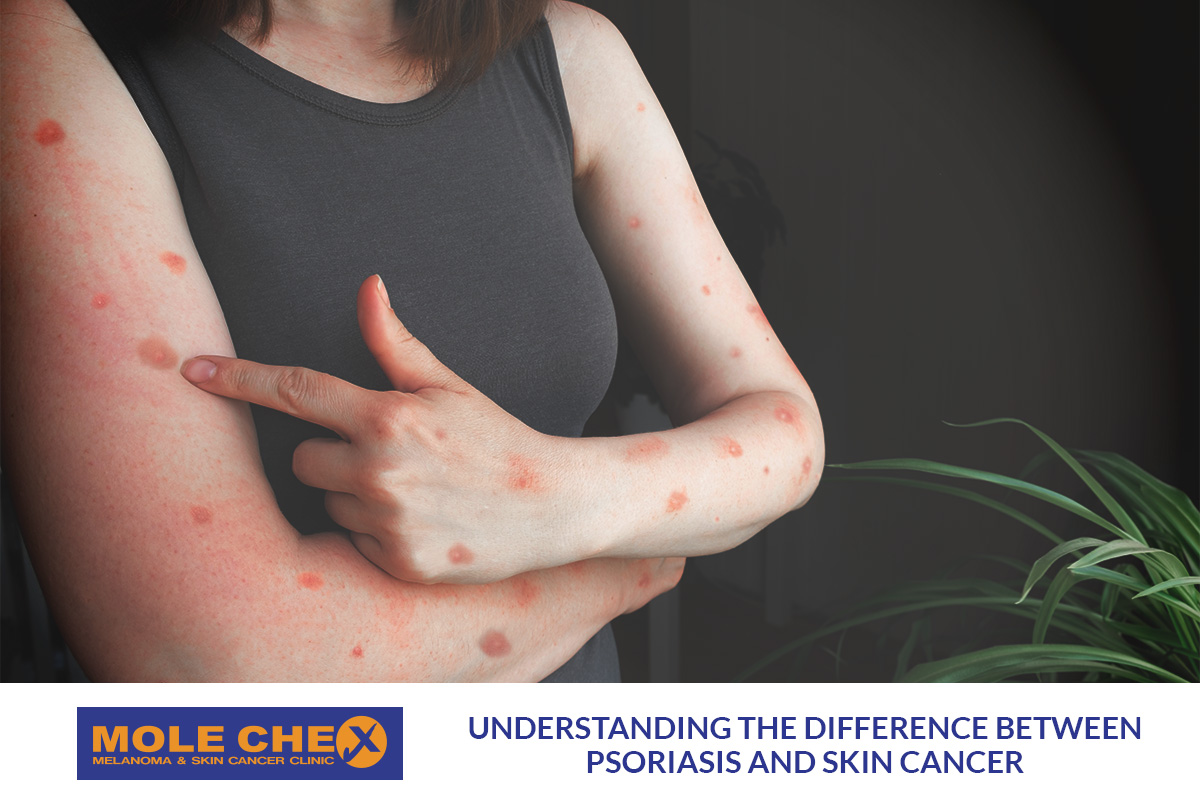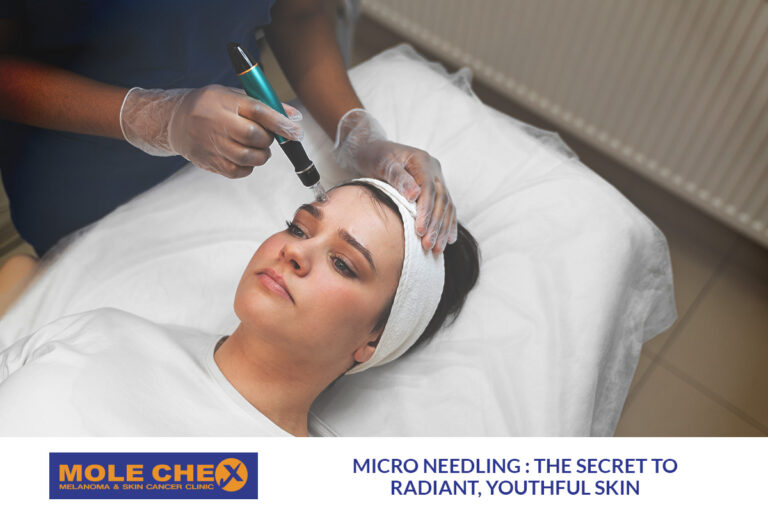Understanding the Difference Between Psoriasis and Skin Cancer

When it comes to skin health, many conditions can appear quite similar, causing confusion and anxiety. Psoriasis and skin cancer are two such conditions that share some visual characteristics but have vastly different causes and health implications. Misinterpreting one for the other can lead to unnecessary stress or delayed medical attention. This blog will guide you through understanding the key differences between psoriasis and skin cancer, helping you make more informed decisions about your skin health.
What We Will Talk About:
- Overview of Psoriasis
- Overview of Skin Cancer
- Key Differences in Symptoms and Appearance
- Diagnosis and Treatment Options
- When to Seek Medical Advice
What Is Psoriasis?
Psoriasis is a chronic autoimmune condition that causes skin cells to multiply faster than usual, resulting in the formation of raised, scaly patches known as plaques. These plaques are most commonly found on the scalp, elbows, knees, and lower back, but they can appear anywhere on the body.
Common Symptoms of Psoriasis:
- Red, raised patches of skin covered with silvery scales
- Dry, cracked skin that may bleed
- Itching, burning, or soreness around affected areas
- Thickened or ridged nails
- Periodic flare-ups triggered by stress, infections, or weather changes
Psoriasis is not contagious and tends to run in families. It is a lifelong condition that can be managed but not cured. While it affects the skin’s appearance and may cause discomfort, it is not life-threatening.
What Is Skin Cancer?
Skin cancer, on the other hand, is an abnormal and uncontrolled growth of skin cells that can be life-threatening if not treated. There are several types of skin cancer, but the most common are basal cell carcinoma (BCC), squamous cell carcinoma (SCC), and melanoma, with melanoma being the most aggressive and dangerous.
Common Symptoms of Skin Cancer:
- A mole or growth that changes in size, shape, or colour
- A sore that does not heal
- A lesion with an irregular border or mixed colours
- A patch of skin that feels itchy, bleeds, or becomes crusty
- A growth that looks different from the rest of your moles (the “ugly duckling” sign)
Early detection of skin cancer, particularly melanoma, can dramatically improve treatment outcomes. Regular skin checks are crucial, especially in Australia, where sun exposure increases skin cancer risk.
Psoriasis vs. Skin Cancer: Key Differences
While both psoriasis and skin cancer can involve the development of abnormal patches on the skin, there are some critical differences:
Texture and Appearance:
- Psoriasis: Typically involves thick, scaly plaques that can be red or silvery-white. The scales may peel off in flakes.
- Skin Cancer: Skin cancer lesions often appear as smooth, shiny, or irregular growths. Melanomas, in particular, may have multiple colours and asymmetrical borders.
Location:
- Psoriasis: Frequently affects areas like the scalp, elbows, and knees.
- Skin Cancer: Skin cancer can develop anywhere but is more common in sun-exposed areas like the face, arms, and neck.
Symptoms:
- Psoriasis: Involves itching, burning, and discomfort, with clear periods of flare-ups and remission.
- Skin Cancer: A sore that does not heal, a changing mole, or a growth that bleeds or crusts is typical of skin cancer.
Underlying Cause:
- Psoriasis: Caused by an autoimmune response, where the body attacks its own healthy skin cells.
- Skin Cancer: Caused by DNA damage to skin cells, often due to UV radiation from sun exposure or tanning beds.
Diagnosing Psoriasis and Skin Cancer
If you are unsure whether a skin change is psoriasis or something more concerning, it is crucial to consult a doctor for an accurate diagnosis. Dermatologists will typically use a combination of visual examination, patient history, and, in some cases, a skin biopsy.
- For Psoriasis: Diagnosis often involves evaluating the characteristic plaques. A skin biopsy may be performed to rule out other conditions.
- For Skin Cancer: Early detection is key. A biopsy is essential to confirm the presence of cancerous cells. For melanoma, your doctor may use the ABCDE method to assess suspicious moles:
- A – Asymmetry
- B – Border irregularity
- C – Colour variation
- D – Diameter greater than 6mm
- E – Evolving or changing over time
Treatment Options
Both psoriasis and skin cancer have a range of treatment options, but they differ greatly based on the condition.
For Psoriasis:
- Topical Treatments: Creams and ointments such as corticosteroids and vitamin D analogues help reduce inflammation.
- Phototherapy: Controlled exposure to UV light can slow the rapid growth of skin cells.
- Systemic Medications: In more severe cases, medications that suppress the immune system are prescribed.
For Skin Cancer:
- Surgical Removal: Skin cancer lesions are often removed surgically, especially melanoma.
- Cryotherapy: Freezing the cancerous cells with liquid nitrogen.
- Photodynamic Therapy (PDT): Using light-sensitive drugs and laser light to destroy cancer cells.
- Radiation or Chemotherapy: Used for advanced stages, particularly in cases of melanoma or where cancer has spread.
When to Seek Medical Advice
If you notice any new or changing skin lesions, it is essential to consult a healthcare professional as soon as possible. While psoriasis is manageable with treatment, skin cancer requires early intervention to prevent further complications. Annual skin checks, especially in sun-prone regions like Queensland, are vital for maintaining skin health and catching potential issues early.
Conclusion
Understanding the difference between psoriasis and skin cancer is essential for anyone concerned about changes in their skin. While both conditions can present with skin abnormalities, they require very different treatments and have different health risks. Psoriasis is a chronic but non-life-threatening autoimmune condition, while skin cancer, particularly melanoma, can be life-threatening if not treated promptly.
If you are ever unsure, a comprehensive skin check from an experienced GP specialising in skin health can provide clarity and peace of mind. Early detection and proper care are the best ways to keep your skin healthy and safe.
This article has outlined the differences between psoriasis and skin cancer to help you better understand what to look out for. Stay proactive, protect your skin, and consult a skin expert if you are concerned about any changes.
Learn more by reading other articles :



